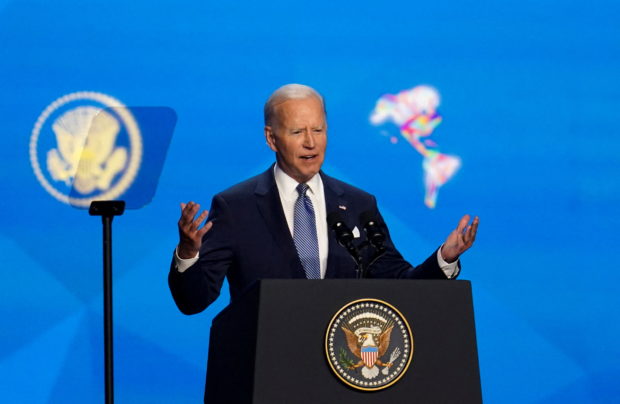Biden presses CEOs to help boost Latin American economies

U.S. President Joe Biden speaks during the ninth Summit of the Americas, in Los Angeles, California, U.S. June 8, 2022. REUTERS/Lauren Justice
LOS ANGELES — President Joe Biden urged top U.S. business executives on Thursday to help bolster his plan for an environmentally-friendly economic partnership with Latin America on the first full day of a regional summit riven by tensions over the guest list.
Speaking at a U.S. Chamber of Commerce-sponsored conference in Los Angeles, Biden made a pitch for increased investment in the economies of America’s southern neighbors to spur pandemic recovery and help address root causes of irregular migration to the United States.
The summit was conceived as an opportunity to reassert U.S. leadership and counter China’s growing economic inroads in the region. But Biden’s agenda has been undercut by a partial boycott by leaders protesting the exclusion of Cuba, Venezuela and Nicaragua.
Telling executives they have an important role in the region’s future, Biden said: “The private sector is able to move quickly to mobilize vast amounts of investment capital, as you’re going to be needed to unlock the enormous potential for growth in this hemisphere.”
Biden’s schedule for Thursday included the summit’s opening plenary session heavily focused on clean energy initiatives followed by his first formal encounter with his Brazilian counterpart, a noted climate change skeptic.
Article continues after this advertisementHe outlined his proposed “Americas Partnership for Economic Prosperity” to the conference, saying it was aimed at bringing supply chains closer to home, reforming the Inter-American Development bank, streamlining investment and kicking climate actions “into high gear.”
Article continues after this advertisementBut the plan, which appears to be a work in progress lacking many specifics, stops short of offering tariff relief and will initially focus on countries that already have U.S. trade accords.
Taking a veiled dig at China, Biden said: “We want to make sure our closest neighbors have a real choice between the debt trap development that has become … more and more common in the region, and the high-quality transparent approach to infrastructure investment that delivers lasting gains for workers and families.”
U.S. officials have openly accused China of pushing deals in the developing world with strings attached to saddle their partners with long-term debt.
The business gathering aimed at strengthening regional economic ties and bringing supply chains back from Asia to counter disruptions was running parallel to the summit.
With problems at the U.S.-Mexico border also high on Biden’s list of priorities, leaders were poised to issue a declaration on Friday pledging measures to curb irregular migration and help countries hosting large number of migrants to cope with them, according to a draft document seen by Reuters.
The White House did not immediately respond to a request for comment on whether the document was final.
Challenges at home and abroad
Biden on Thursday was due to chair leaders’ talks aimed at promoting energy security as Western powers try to lower their dependence on oil and gas from Russia.
He hosts the regional summit facing challenges at home and abroad ranging from surging inflation, debate over gun control after more mass shootings, and the war in Ukraine.
Yet instead of burnishing regional unity, the summit has been bedeviled by diplomatic strife sparked by Washington’s exclusion of its three main regional antagonists on the grounds they have poor records on human rights and democracy.
That upset allies of the leftist trio of countries, in particular Mexican President Andres Manuel Lopez Obrador, who made good on a threat to stay away if all nations were not invited.
Other leaders said they would do the same, and did so, thinning the line-up of visiting heads of state and government in attendance to 21.
“No,” Biden responded when a reporter asked whether he was concerned about some leaders boycotting the summit. His aides have played down the absences and insisted they would still secure meaningful agreements with those present.
Speaking in Mexico City, Lopez Obrador backed Washington’s drive to strengthen economic ties in the region, but urged the United States to get over its decades-long differences with Communist-ruled Cuba. Havana was invited to the past two Americas summits.
“America should integrate economically and commercially while respecting the sovereignty of each country,” he said.
“We can do it if we unite.”
The partial boycott has given greater prominence to the first meeting between Biden and Bolsonaro, an admirer of former U.S. President Donald Trump who this week again cast doubt on Biden’s 2020 election victory.
Biden on Wednesday previewed the coming summit declaration on migration, calling it “a ground-breaking, integrated new approach” with shared responsibility across the hemisphere.
But he provided few specifics.
RELATED STORY:
Leaders at Americas summit eye plan to manage impact of migration
US unveils new Latin America economic plan at reboot summit dogged by dissent